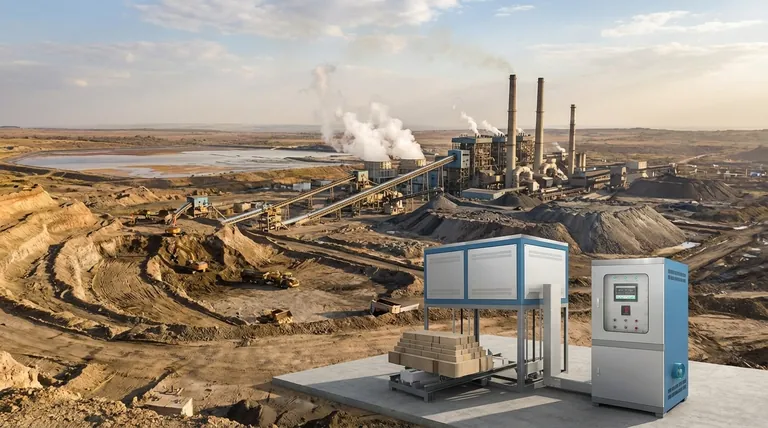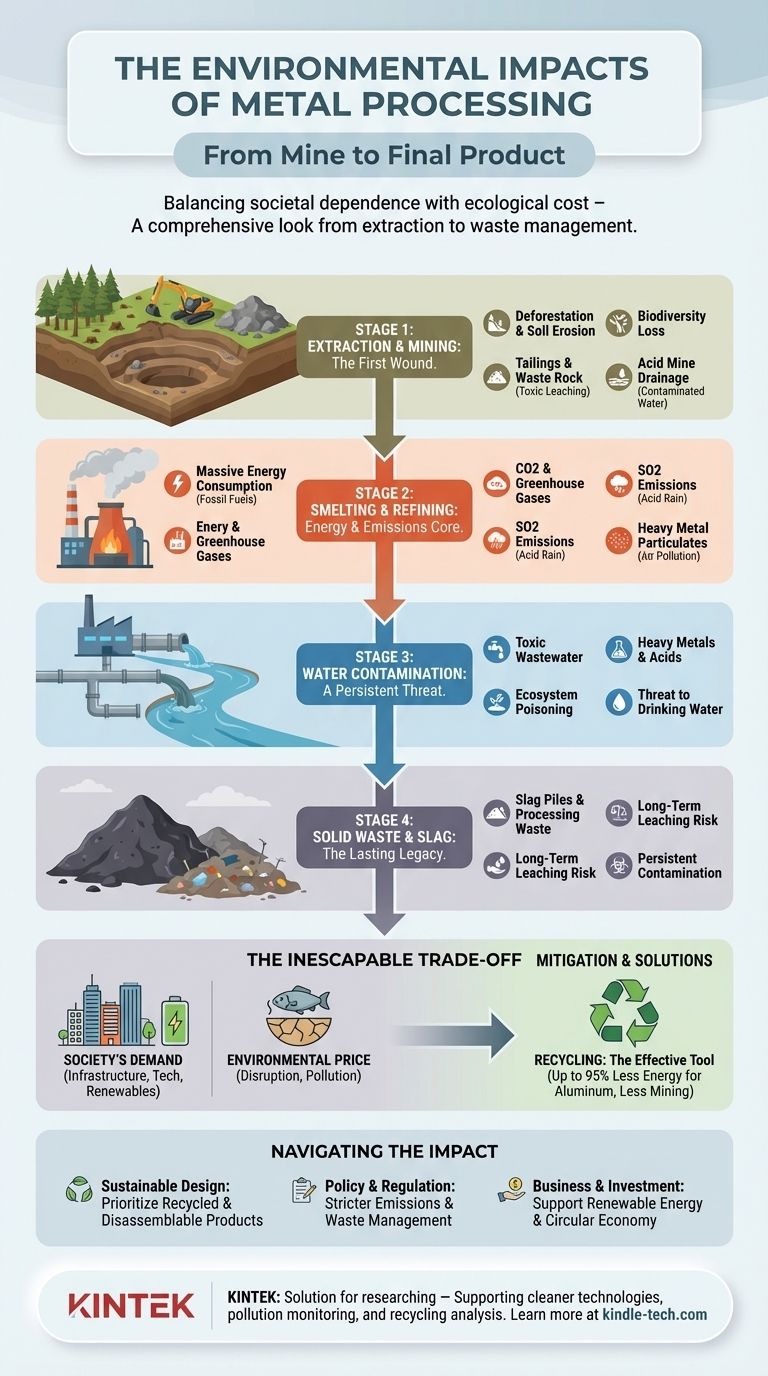At its core, metal processing has profound environmental impacts driven by immense energy consumption, the release of harmful pollutants, and significant land and water disruption. From extracting raw ore to smelting and refining, each step introduces major environmental costs, including air pollution that causes acid rain, water contamination from heavy metals, and the generation of vast quantities of solid waste.
The central challenge of metal processing is that converting stable, low-energy metal ores into unstable, high-energy pure metals is an inherently disruptive process. This transformation demands massive energy inputs and creates waste byproducts that are often toxic to the environment.

The Scope of Impact: From Mine to Final Product
The environmental consequences of metal processing are not isolated to a single factory but span the entire production chain, from the initial disturbance of the earth to the final refined product.
Extraction and Mining: The First Wound
The process begins with mining, which fundamentally alters landscapes. This involves deforestation, soil erosion, and the loss of biodiversity as large areas are cleared for open-pit or underground mines.
A significant byproduct of mining is tailings—the leftover rock and mineral waste. These often contain toxic heavy metals and chemicals that can leach into soil and groundwater for centuries. A critical risk is acid mine drainage, where sulfide minerals in exposed rock react with air and water to create sulfuric acid, which contaminates streams and rivers.
Smelting and Refining: The Energy and Emissions Core
Smelting, the process of using heat and chemical agents to extract metal from its ore, is the most energy-intensive stage. This enormous energy demand is typically met by burning fossil fuels, releasing vast amounts of carbon dioxide (CO2) and other greenhouse gases.
This stage is also the primary source of air pollution. Smelting sulfide ores (like those for copper, zinc, and nickel) releases large quantities of sulfur dioxide (SO2), a primary contributor to acid rain. Furthermore, fine particulates containing heavy metals like lead, arsenic, and cadmium can be released into the atmosphere, posing serious health risks.
Water Contamination: A Persistent Threat
Metal processing requires substantial amounts of water for cooling, mineral separation, and dust control. This water often comes into direct contact with hazardous materials.
The resulting wastewater can be highly contaminated with acids, suspended solids, and dissolved heavy metals. If not properly treated before discharge, this effluent can poison aquatic ecosystems and contaminate drinking water sources for downstream communities.
Solid Waste and Slag: The Lasting Legacy
Smelting separates the desired metal from the waste rock in the ore, creating a glass-like byproduct called slag. While some slag can be repurposed (e.g., in construction), much of it is discarded in large piles.
These slag heaps, along with other processing wastes, can contain residual heavy metals that may leach into the environment over time, creating a long-term contamination risk that persists long after the processing facility has closed.
The Inescapable Trade-off: Industrial Demand vs. Environmental Cost
Understanding the impacts of metal processing requires acknowledging the difficult balance between our society's dependence on metals and the environmental price of producing them.
The Necessity of Metals
Metals are the foundation of modern civilization. Steel forms our infrastructure, copper enables our electrical grids, and specialty metals like lithium and cobalt are essential for the batteries powering the transition to renewable energy. We cannot simply stop producing them.
The Power of Recycling
Recycling is the single most effective tool for mitigating these environmental impacts. Creating metal from recycled sources uses drastically less energy than producing it from raw ore—for example, recycling aluminum requires up to 95% less energy.
Recycling also eliminates the need for new mining and reduces the volume of waste sent to landfills, directly addressing the most damaging stages of the production lifecycle.
The Limits of Modern Mitigation
While modern processing plants are equipped with technologies to reduce harm, such as scrubbers to capture SO2 emissions, these are not perfect solutions. They reduce the rate of pollution but do not eliminate the core problems of high energy consumption and waste generation. These technologies also add complexity and cost to the operation.
Navigating the Environmental Impact
Choosing materials and supporting industries responsibly requires a clear understanding of these impacts and the levers available to reduce them.
- If your primary focus is sustainable design: Prioritize the use of recycled metals and create products that can be easily disassembled to facilitate future recycling.
- If your primary focus is policy or regulation: Concentrate on enforcing stricter emissions standards for smelters and implementing robust, long-term management plans for mine tailings and wastewater.
- If your primary focus is business or investment: Favor companies that power their operations with renewable energy, invest heavily in pollution-control technologies, and actively participate in the circular economy.
Ultimately, acknowledging the full environmental cost of metal processing is the first step toward making more informed decisions and building a truly sustainable industrial future.
Summary Table:
| Impact Category | Key Environmental Effects | Primary Sources |
|---|---|---|
| Air Pollution | Acid rain, greenhouse gas emissions, heavy metal particulates | Smelting, fossil fuel combustion |
| Water Contamination | Toxic heavy metals, acid mine drainage, wastewater discharge | Mining, smelting, refining processes |
| Land Disruption | Deforestation, soil erosion, biodiversity loss, solid waste (slag, tailings) | Mining, waste disposal |
| Energy Consumption | High CO2 emissions from fossil fuel use | Smelting, refining stages |
Looking to make your metal processing more sustainable? KINTEK specializes in advanced lab equipment and consumables that help researchers and engineers analyze and mitigate environmental impacts. Whether you're developing cleaner smelting technologies, monitoring pollutants, or improving recycling processes, our tools support your sustainability goals. Contact our experts today to find the right solutions for your laboratory needs.
Visual Guide

Related Products
- Laboratory Muffle Oven Furnace Bottom Lifting Muffle Furnace
- 1800℃ Muffle Oven Furnace for Laboratory
- 1400℃ Muffle Oven Furnace for Laboratory
- 1700℃ Muffle Oven Furnace for Laboratory
- 1400℃ Laboratory High Temperature Tube Furnace with Alumina Tube
People Also Ask
- How do metal oxides like Cerium Oxide (CeO2) or Zinc Oxide (ZnO) function in solar thermochemical cycles?
- What is the sputtering voltage of a magnetron? Optimize Your Thin Film Deposition Process
- Why is 100% sinter not used in blast furnace? Avoid Crippling Gas Flow & Instability
- What is evaporator used in pharmaceutical industry? A Guide to Concentrating APIs and Recovering Solvents
- How do you decide which equipment is required in your laboratory? A Strategic Guide to Smart Lab Investments
- What is the significance of a high-shear homogenizer in membrane preparation? Ensure Superior Casting Performance
- What is the physics of magnetron sputtering? Achieve Superior Thin Film Coating for Your Lab
- Why is it important to match the freezer temperature to storage recommendations? Optimize Food Safety & Energy Use



















